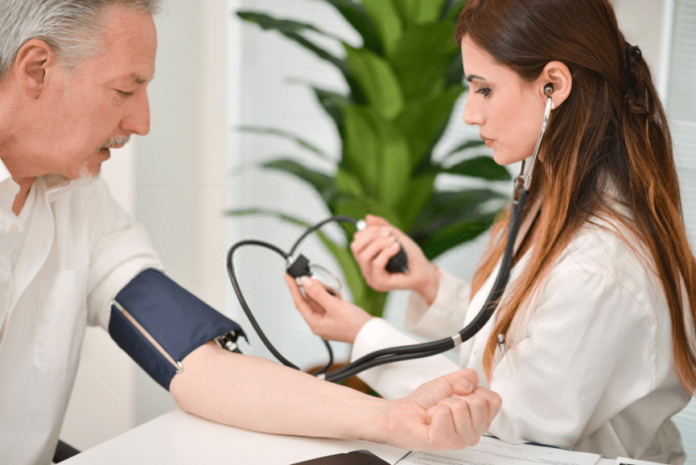Blood pressure constantly changes based on daily activity. The unpredictable causes of sudden high blood pressure can also be related to your mood or the time of day. In most cases, a sudden onset of blood pressure measurement can return to normal when blood pressure has been stable for most of life.
If blood pressure is normal, doctors often repeat a second and third blood pressure measurement before worrying. However, if a sudden or dramatic rise in blood pressure persists for over a few days, you may need to see a doctor. Short-term hypertension can cause an acute attack, while long-term hypertension can have dangerous and devastating consequences.
An unpredictable or sudden increase in high blood pressure can cause nosebleeds, dizziness, headache, and chest tightness. Multiple increases in blood pressure can cause small strokes, which can damage the brain.
If your blood pressure rises sharply and remains high, it could mean other serious medical problems or obvious causes that need to be resolved. The sudden onset of hypertension may be due to the side effects of some medications (both prescription and “on the go”). If your body produces too many hormones, it can cause an unexpected rise in blood pressure.
Kidney disease that reduces blood flow to the kidney or even the identified complications associated with pregnancy can also cause a sudden onset of hypertension. Obvious causes that prevent doctors from treating patients unnecessarily and possibly having complete control over them must be addressed.
These causes of sudden onset can be excessive consumption of alcohol or caffeine. Other prominent reasons include the use of cocaine and other prescription medications, such as oral contraceptives, anti-inflammatories, adrenal steroids, nasal congestion, or antidepressants.

Of course, the doctor will prescribe a medical exam to treat these events. They need to be monitored by a hospital for some short-term treatments for hypertension. The resident doctor will prescribe antihypertensive therapy to lower blood pressure.
The therapy is administered by intravenous injection. This therapy is commonly used when there is a risk of severe organ damage. However, in the case of chronic pulmonary edema, the doctor will prescribe an intravenous diuretic treatment. The Causes of sudden high blood pressure are massive, but they can be self-sufficient. It is recommended to consult a doctor if chronic hypertension persists.
How Can I Avoid The Causes of Sudden Blood Pressure?
As people with hypertension, we feel a sudden rise in high blood pressure, causing short-term dizziness and depression. It is often associated with certain daily activities. Small changes in how we do things will significantly reduce the risk of a head attack and avoid some possible serious consequences.
The Risks Associated with Hypertension Increase Regularly
It is one of the causes of sudden high blood pressure in the human body. People with hypertension are at risk for two main problems associated with blood flow to the head:
Anxiety and Dizziness
We may not know where or how to get there, especially in an unfamiliar environment. Our coordination can also be interrupted. The sudden need for a chair or table, a person, or something to prevent us from falling worries our neighbor about our general health. You can also call a doctor.
Damage
In case of sudden changes in blood pressure, there is a risk of injury in case of fatigue and falls.
Injury May be Caused by
- Touch a hard object, such as a table or chair, when we fall to the ground. When we do this, painful cuts and bruises can occur, but there is also a risk of serious head injury.
- Heavy landings on an internal or external hard surface can also cause damage. These injuries can include broken bones and an increased risk of head injury. Adults are at risk of damaging their hips, which can have serious consequences.
How to Avoid a High Blood Pressure Rush to The Head
Do you want to reduce the causes of sudden high blood pressure? These events are often associated with daily activities that involve a sudden change in our position to turn or sit and in the bow.
If you change how we perform these movements, as described below, the probability of an episode, and thus the risk of injury, will be significantly reduced.
Getting Out of Bed
- Avoid jumping into bed in the morning. Take some time for this.
- Lie down for about a minute after waking up.
- Then sit down and gently put your heels on the floor. Sit on the side of the bed for a moment. This gives your body time to get used to changing the blood flow.
- Stay in bed when you get up. Sit down if you feel dizzy or weak.
- If you don’t experience side effects after 10-15 seconds of rest, you can start walking.
Getting Up From a Chair
- When we get up from a sitting position, we shift our attention. This moves the head forward and kneels.
- Blood pressure increases when we bend down, and gravity suddenly decreases when we get up.
- Take a break before stopping.
- When you get up, get up and don’t bend over. If the chair has armrests, do them to stand up.
Bending Down
- We feel a sudden change in blood pressure and move to the head when we suddenly bend.
- In addition, Besides the urgent need to evade, it is better not to bend at the waist but at the knee.
Whatever your posture, try to stop the movements with a short pause before getting up. These short pauses will help prevent you from causes of sudden high blood pressure.

